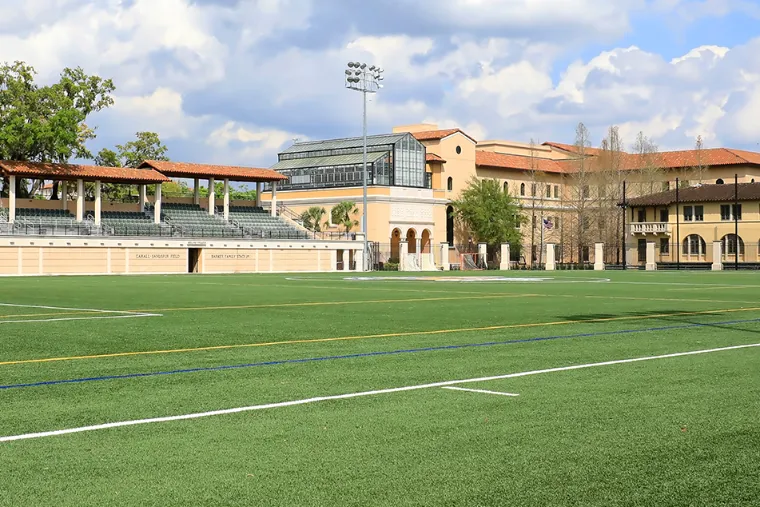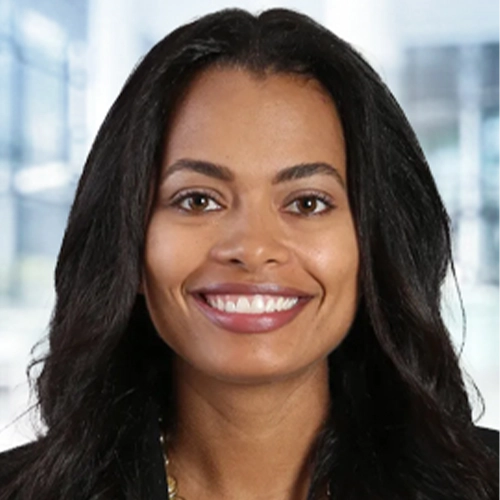
Interview with Bryan Blair, VP & Director of Athletics at Toledo

This month, we are excited to spotlight Bryan Blair, Vice President and Director of Athletics at Toledo. Go Rockets! Bryan is an absolute star and one of the most well-respected people in the industry. He is enthusiastic, transparent, hardworking, caring, intelligent, empathetic, but more importantly – FUN.
Bryan’s career has taken him to many great places. He holds a law degree from the University of South Carolina and earned his undergraduate degree from Wofford College. After starting his career at the NCAA and University of South Carolina, he held leadership positions at Washington State and Rice.
Bryan was also named to the Sports Business Journal’s “Forty Under 40” Class of 2024.
Let's get to know Bryan a little better.

Why did you get into college athletics?
Sports have been a part of my life as far back as I can remember. From playing on the playgrounds and backyards as a child to competing in four sports in high school and then onto college football, sports were always part of my journey. It then became my professional path and it’s hard for me to remember a time when sports wasn’t a huge part of my life.
My passion for college athletics is fueled by both my student-athlete experience and my belief in the power of sports to transform individuals and communities. Playing football at Wofford College taught me so many invaluable life lessons and ignited my desire to work in college athletics, particularly the opportunity to influence positive change in studentathletes’ lives and the communities they represent.
After graduating from Wofford, I attended law school at the University of South Carolina and realized that sports offered a unique intersection of competition, education, entrepreneurship and leadership. Over time, it became clear that serving as an athletic director one day would allow me to combine my legal expertise with my passion for sports, higher education, business and community engagement. The ability to shape a department, impact a community, push innovation, and empower student-athlete growth, both personally and professionally, is what excites me each and every day.
As an administrator, did you face any barriers as you were growing the business? If so – how did you work through those?
I view all “barriers” as opportunities, but two examples come to mind immediately. First, I’ve typically been the youngest in the room at each step of my career. I’ve been blessed to receive opportunities at early stages, but with that comes the challenge of leading those much older than you, finding your voice and confidence, and not having decades of experience to draw upon. That said, youth can be countered by curiosity, innovation and self-awareness, and be a positive. I try to get the most out of each and every experience and engagement, and seek to get a full understanding of a matter while searching for ways to improve what exists. As a leader, I’ve leaned heavily into building authentic relationships—whether with donors, corporate partners, co-workers or industry colleagues. I often rely on my vast network, from hiring decisions to organizational structure. You’re always better, together. Finally, I often get asked what it’s like to be an AD during this time of change, and I joke that it is all I know! I plan to be in this industry for decades to come so the reality is that I spend zero time lamenting what was and 100% of the time figuring out what is and how can it help us be the best version of ourselves.
A second example is the diversity of places I’ve worked. All of the universities I’ve served - Rice, South Carolina, Washington State, and Toledo - have presented unique challenges, from their geographical locations to stringent admissions standards; from financial challenges to political dynamics. The great thing that each of my stops taught me was how to use creativity, work ethic, strategy and teamwork to overcome any perceived disadvantage. These diverse experiences bring out the best in any administrator and reinforce the skills you learn as a student-athlete as you work to overcome adversity, harness the power of team and motivate those around you.
I often say, “anything worth having is on the other side of hard”, and there is nothing more rewarding than finding success when others see only the impossible!
We all know the saying “it takes a village”. Can you tell us about the importance of your village in college athletics?
As a lifelong teammate, “it takes a village” could not be any more spot on as it relates to my journey. It starts with my family. My parents were both educators prior to my Dad becoming an entrepreneur. My love for sports, coupled with valuing education and a passion for business and entrepreneurship, is my why. My Mom was a stronger enforcer than the NCAA, mandating that I had good grades to play sports, and I watched both of my parents exhibit a work ethic that is frankly incomparable. My upbringing and life experiences shaped the kind of father, husband, and leader I am today and why I value the role I play in creating a “village” for future generations.
Today, my village includes my wife, Jenna, and our kids, Bri (6) and Beau (4). Jenna is the cornerstone of our team—she keeps everything running smoothly and is not only my best friend but also an instant favorite of everyone she meets. My children are my world, constantly reminding me of the example I must set for future generations. They also serve as a daily reminder of the responsibility I carry to uphold our family’s name with unwavering integrity.
Building a strong, collaborative team is essential for success, and at Toledo, we have a shared vision between athletics, the university, and the local community—what we call “Team Toledo.” My experience as a campus-wide collaborator, from chairing a Provost search to partnering with departments like Engineering for game day experience enhancements, has taught me how to integrate athletics into the broader university mission. It’s not just about winning; it’s about elevating the entire institution. The support we get from our faculty, staff, donors, and the local community is what has enabled Toledo to thrive, especially in areas like football/basketball success, fundraising, and NIL. The village truly drives our mission, and everyone plays a vital role in our collective success.
What is your proudest moment, so far, since working in college athletics?
When I became the AD at Toledo, I followed an esteemed leader who had a profound impact on the department for more than a decade. Naturally, stepping into such large shoes came with doubts about my abilities and some resistance to change. With that context, I am incredibly proud of what our team has accomplished in the last three years.
Toledo Athletics has truly soared, making it one of the top programs in the country when considering combined conference wins in football, men’s basketball, and women’s basketball. We’ve led the Mid-American Conference in attendance, shattered fundraising and academic records, and been at the forefront in the NIL space. We’ve also been honored as the MAC’s best overall athletic department for three consecutive years, an unprecedented achievement. However, what excites me the most is that we have barely scratched the surface of our potential—our brightest days are ahead!
While I don’t believe there’s a single “proudest moment” yet, one recent experience that stands out was our six-overtime thrilling bowl win over the ACC’s Pitt. The victory was special not only because it was the longest overtime bowl game in NCAA history, but because it showcased the resilience and never-give-up mentality of our team. Time and time again, they got up and kept battling—truly inspiring to watch. The national exposure that followed lifted up the entire institution and community. The next morning, Good Morning America featured Toledo on national television, highlighting our football program and community. It was a surreal moment to see our university and city in the spotlight, a proud achievement for all of Toledo. This wasn’t just a victory for football—it was a victory for all of “Team Toledo”, reminding us of the broader impact that college athletics can have on an institution.
What was the most surprising thing going from being a Deputy to sitting in the AD chair?
The biggest surprise to me was the increased weight of every decision. I like to say that as the Deputy AD/COO at Washington State, I was the Chief Suggestion Officer. I had a strong understanding of the role under the mentorship of one of the most respected ADs in the country, Pat Chun, but at the end of the day, I was just a sounding board for the most critical department-wide decisions. Stepping into the AD chair adds new layers and depth of leadership responsibility—from navigating complex NIL regulations to overseeing largescale fundraising initiatives and driving national brand visibility. The demands of balancing the long-term vision with the day-to-day operations of the department, especially at the midmajor level, can be challenging. The role requires constant innovation, agility, and bold decision-making. My time in both the Group of Five and Power Five environments, as well as my direct leadership experience with elite coaches, has prepared me to manage this complexity and help us thrive in an ever-changing landscape.
What advice do you have for young administrators trying to break into college athletics?
Stay relentless and don’t take no for an answer. I received countless rejection letters from jobs I applied for early in my career and even more non-responses as I reached out to potential mentors and professionals as I simply sought advice. Stay the course and don’t be discouraged. Remember, anything worth having is on the other side of hard!
I also encourage others to be curious and innovative. The landscape of college athletics is shifting rapidly, and young administrators must stay ahead of the curve, particularly in areas like NIL, digital media, data science and revenue generation. Start by getting handson experience in the industry—whether through internships or entry-level roles—and build relationships early. Be proactive in seeking out mentors and learning from leaders who have navigated the challenges you’ll face. From my experience, some of the best leaders have not only been great problem solvers but also have demonstrated grit and resilience in the face of adversity.
Lastly, define your “why” and your core values, and develop a deep understanding of how all departments in athletics work together. That knowledge will set you up to make a lasting impact as a leader on all you serve. At the end of the day, it’s not about what you do, but who you positively impact along the way.
Get To Know Bryan
Favorite food?
BBQ - Carolina Vinegar based, IYKYK
Favorite song?
“My Way” - Frank Sinatra
Favorite thing to do outside of work?
Spend time with my family and dogs, usually at a sporting event or park/playground.
Best professional opportunity you have taken part of?
The SBJ Forty Under 40 was the most humbling, inspiring event I’ve attended to date, and it left me hungry to have more of an impact in this industry that I love.
Meet the Author



